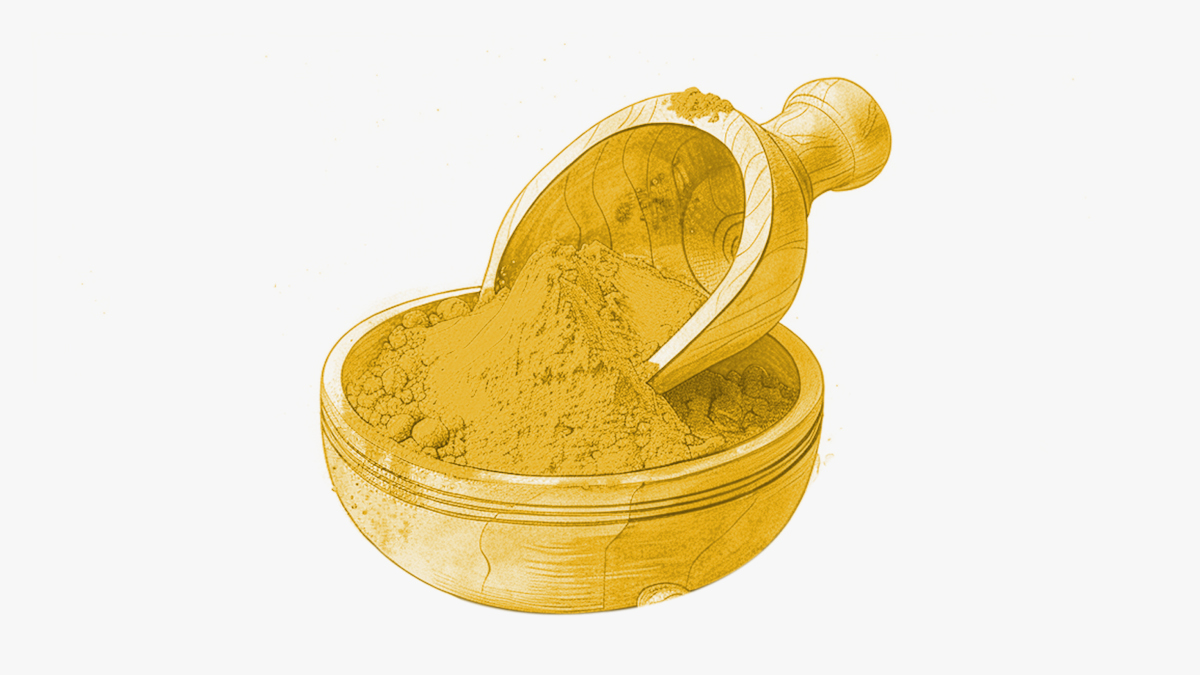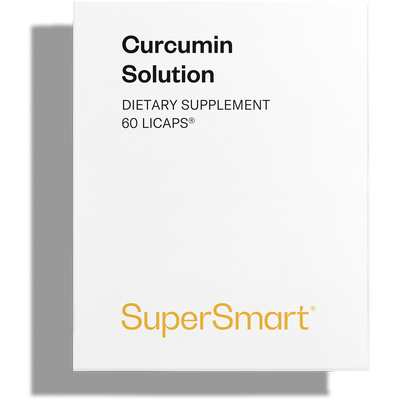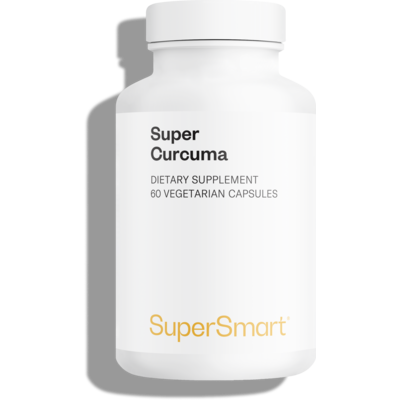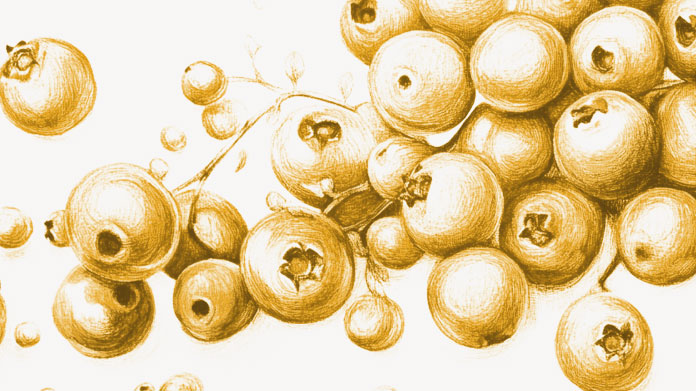Turmeric supplementation: how long?
Regenerative, protective, antioxidant: turmeric is a key plant of Ayurvedic medicine, widely-studied for many years for its numerous health benefits. But how long should a course of supplements last?

Turmeric: a key plant of Ayurvedic medicine
Definition of turmeric
Turmeric is a plant from the ginger family. Consumed as a culinary spice, its underground stem (rhizome) is also traditionally used in Ayurvedic medicine to treat a wide range of ailments such as inflammation, gastric problems, infectious diseases, etc. (1)
Turmeric’s active ingredients
For several decades now, numerous studies have been conducted on turmeric to confirm these effects. This research has resulted in the isolation of various active ingredients, including polyphenols, sesquiterpenes, diterpenes, triterpenoids, sterols and alkaloids (2).
Curcumin, which makes up 2%-5% of turmeric and which is a powerful antioxidant with anti-inflammatory properties, is undoubtedly the most widely-studied of its molecules. However, it appears that some of turmeric’s effects are unrelated to this active ingredient and are the result of other molecules contained within this multi-beneficial natural remedy.
Turmeric’s benefits as shown by research
At a molecular level, turmeric has been shown to modulate a number of cell signaling pathways. Cell studies have also demonstrated its potential as an antimicrobial agent, a radioprotective agent, an insecticide, larvicide, and antimutagen (3).
Animal studies, meanwhile, have identified its potential against pro-inflammatory diseases, cell proliferation, neurodegenerative problems, depression, diabetes, obesity and atherosclerosis.
In humans, turmeric is generally recognized as having effects on inflammation, the digestive system, immunity, the liver, the respiratory tract and the blood, as well as on fighting oxidative stress. Several clinical trials have studied its efficacy against numerous diseases, including lupus nephritis, cancer, diabetes, irritable bowel syndrome, acne and fibrosis.
Let’s now look at the question of how long turmeric supplementation should last, based on the complaint being targeted.
Focus on turmeric’s various uses and supplementation periods
How to use turmeric as an anti-inflammatory
Numerous studies have shown that curcumin helps the body control the inflammatory response. Specifically, curcumin is believed to inhibit the NF-kB and other pro-inflammatory signaling pathways. In doing so, it blocks the expression of pro-inflammatory cytokines, certain interleukins and tumor necrosis factor alpha (TNF-alpha).
These anti-inflammatory properties have been a focus of studies investigating treatments for IBS, rheumatoid arthritis and non-alcoholic fatty liver disease, amongst others (4).
In all these situations, the first positive effects of turmeric supplementation were noted after four weeks (1 month), and an average of 12 weeks (3 months) appeared to be the appropriate duration for optimal effects.
Turmeric and digestion
The European Medicines Agency recognizes the traditional use of turmeric for relieving intestinal discomfort in digestive problems, with a recommended supplementation period of 15 days (5).
Turmeric and weight loss
Curcumin, turmeric’s most potent active ingredient, supports digestion and liver health (6). Since it is also a powerful antioxidant and is thought to have anti-inflammatory properties, it may help to maintain energy levels and cleanse the body during weight loss diets, especially since, according to some studies, curcumin promotes glucose metabolism and fat elimination.
Conversely, it can also help those who have experienced unwanted weight loss as it stimulates the appetite.
In a weight-loss context, moderate-dose turmeric supplementation should therefore be continued throughout, or for part of the duration of, the diet.
So how long should you take turmeric supplements for?
To conclude, the optimal duration for turmeric supplementation depends on the problem targeted, the dose taken and whether it is in a preventative or curative capacity, but the best approach seems to be to continue taking your turmeric supplement for around 8-12 weeks (2-3 months)..
Let’s now look at the ideal supplementation periods for the different turmeric supplements offered by SuperSmart.
Turmeric supplements: bioavailability and recommended duration
On paper, turmeric would seem to be a miracle remedy offering multiple benefits. In reality, however, things are a little more complicated. The curcumin in turmeric actually has relatively low bioavailability (7).
So to benefit from turmeric’s properties, you either need to consume large amounts of turmeric powder (at least 1g-2g a day), or take specific supplements standardized in high levels of curcumin (such as Natural Curcuma for 1-2 months).
There are also patented forms of curcumin, combined with other molecules that promote its absorption like piperine, designed to make the curcumin as bioavailable as possible (such as Super Curcuma, which contains a form 29 times more assimilable than standard products, to be taken for a period of 5-10 weeks, or Curcumin Solution, which is 185 times more absorbable than conventional curcumin, to be taken for 1 month).
Are there any side-effects associated with turmeric?
There are few known or documented adverse effects associated with turmeric. A few cases of hepatitis have been noted in connection with very high doses of turmeric but no causal link has been established. High intakes of turmeric powder may also lead to flatulence and nausea (8).
That said, given the lack of data, and the fact that turmeric is also traditionally recommended for treating amenorrhea (absence of periods), the European Medicines Agency advises women who are pregnant or breastfeeding, and those under 18, against taking turmeric. But this is purely precautionary.
In any event, turmeric supplements can be taken safely for several weeks provided the supplement manufacturer’s recommendations are followed. It goes without saying though, that at the first sign of any problem (gallstones, liver pain), you should stop supplementing and consult a doctor to investigate the cause of the problem.
SuperSmart ADVICE
References
- HOMBOURGER, Christelle. Le Curcuma, de l'épice au médicament. 2010. Thèse de doctorat. UHP-Université Henri Poincaré.
- AKRAM, Muhammad, SHAHAB-UDDIN, Ahmed A., USMANGHANI, K. H. A. N., et al.Curcuma longa and curcumin: a review article. Rom J Biol Plant Biol, 2010, vol. 55, no 2, p. 65-70.
- RATHORE, Surbhi, MUKIM, Mohammad, SHARMA, Pratishtha, et al.Curcumin: A review for health benefits. J. Res. Rev, 2020, vol. 7, no 1, p. 273-290.
- https://www.ema.europa.eu/en/documents/herbal-monograph/draft-european-union-herbal-monograph-curcuma-longa-l-c-domestica-valeton-rhizome-revision-1_en.pdf
- https://www.vidal.fr/parapharmacie/phytotherapie-plantes/curcuma-longa.html
- RIVERA‐ESPINOZA, Yadira et MURIEL, Pablo. Pharmacological actions of curcumin in liver diseases or damage. Liver International, 2009, vol. 29, no 10, p. 1457-1466.
- ANAND, Preetha, KUNNUMAKKARA, Ajaikumar B., NEWMAN, Robert A., et al.Bioavailability of curcumin: problems and promises. Molecular pharmaceutics, 2007, vol. 4, no 6, p. 807-818.
- NG, Qin Xiang, SOH, Alex Yu Sen, LOKE, Wayren, et al.A meta-analysis of the clinical use of curcumin for irritable bowel syndrome (IBS). Journal of clinical medicine, 2018, vol. 7, no 10, p. 298.
Keywords
1 Days
Quick shipping
Quick shipping; good price. No issues!
Mary McCarty
3 Days
Thr product is very good and is helping…
Thr product is very good and is helping me on my health. Then is always on time
LUGO Luz
5 Days
Buying was fine
Buying was fine. I had problems with the website not recognizing my login info, and had to call to get it fixed. Other than that, everything was good.
David S. Clark
6 Days
Your super maca and super ginseng are…phenomenal
Your super maca and super ginseng are phenomenal supplements that compliment each other when taking them together. Fantastic feeling of well-being and lots of mid day energy without the crash.
Keith Mason
8 Days
I have had amazing results with every…
I have had amazing results with every supplement I've purchased. I am extremely satisfied with this company
kirstin Torres
9 Days
Fine products
Fine products . They are on the leading edge of online supplements. The only issue -so far-is they sometime run out of subscription items.
Jason Argos
11 Days
The ordering process is very user…
The ordering process is very user friendly and the products always come in a timely manner.
CARTER Rhonda
12 Days
The price for Dr
The price for Dr. Pero's AC-11 is reasonable and in line with his views. (my former colleague). Keep it pure.
CAMPBELL Clayton
15 Days
Right on every time.
Right on every time.
Arthur Nicholas
18 Days
They are cheaper than everyone else and…
They are cheaper than everyone else and the shipping was fast. Great company.
Patricia Adams
25 Days
Availability of quality health…
Availability of quality health supplements and it's wide variety is impressive. Ordering is seamless and shipping even during the holidays is well streamlined.
Mohamad Hussein
39 Days
A Product worth waiting for when not…
A Product worth waiting for when not available and then arriving as a surprise!
DOMINIC
40 Days
On time shipping
On time shipping
GEORGE Verne
42 Days
Ordering was easy and the product was…
Ordering was easy and the product was delivered with no problems. Appreciated that I was notified when it would arrive. Thanks!
MascarC
48 Days
Great customer service - responsive …
I ordered from them and my item was unavailable for sometime. I was super happy when they reactivated my order and shipped my item which arrived very quickly. Great customer service.
Ruth Rueter





